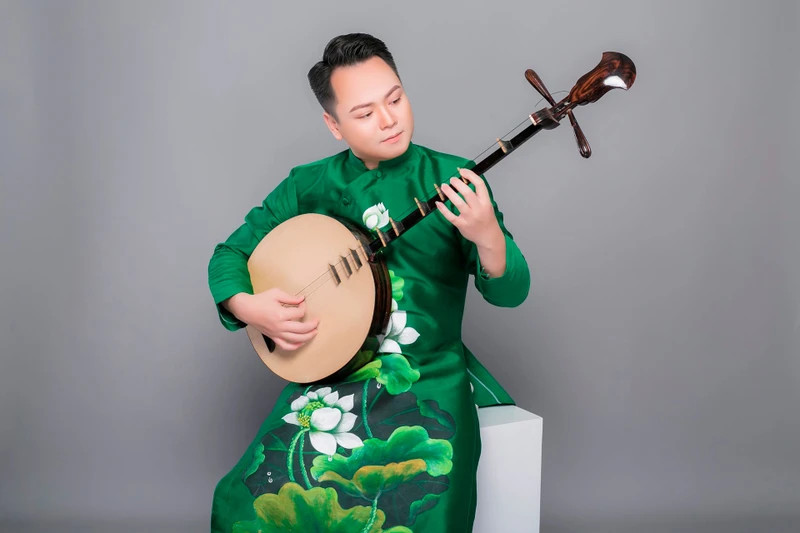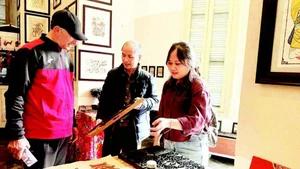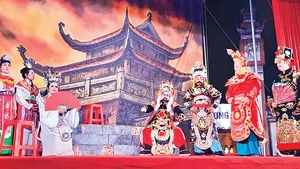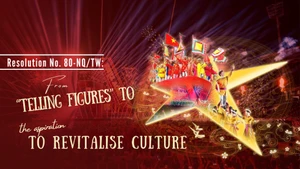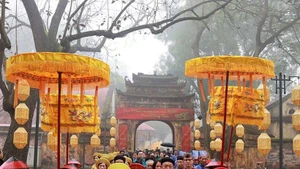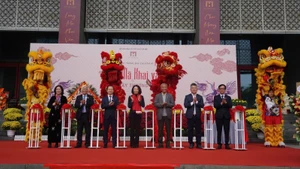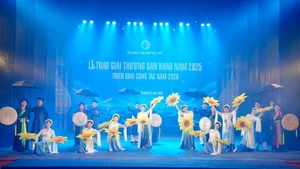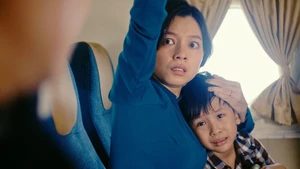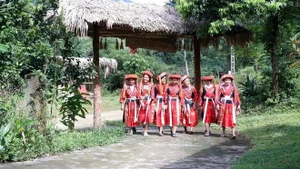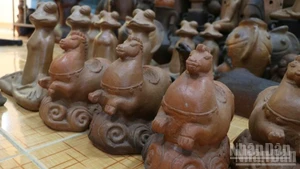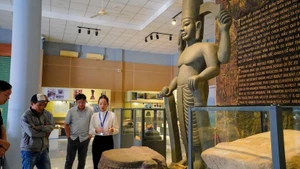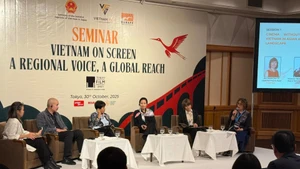Lê Thanh Phong (born in 1992) is an editor for the Folk Songs and Traditional Music Programme on VOV3 (Voice of Vietnam) and the Head of the UNESCO Nghe Folk Songs Art Troupe in Hanoi. Over the years, he has consistently been awarded commendations for his efforts in preserving and promoting the national cultural heritage by the Vietnam Cultural Heritage Association.
Igniting the flame of passion by himself
Q: It is known that you have brought Nghe Tinh Vi - Giam folk songs to international audiences more than once. Could you share some memorable and profound impressions from those trips with our readers?
A: For artists like us, performing is already a great joy and an even greater happiness to bring our music abroad.
My first international trip happened in 2017 when I participated in the 11th Traditional International Music Festival "Shark Taronalari" in Uzbekistan. At the time, I had just graduated, so it was inevitable that I felt some pressure. In addition to singing folk songs, I also had to practice playing the gongs and drums for the Hat Van (spiritual singing) performances alongside other artists in our group, which consisted of only six members. That festival was actually a competition, not just a simple showcase of performances from art troupes worldwide. However, I must say that the Vietnamese team did exceptionally well, as all six members received excellent certificates, along with an overall excellence award for the entire troupe.
After the festival, we had three more performances, interacting with the people in Uzbekistan. It was an incredible feeling to hear the melodies of our homeland's folk songs resonating in such a distant land and being so warmly embraced by the local audience. They danced and joined in, adding energy and closeness to the atmosphere. That moment filled me with a deep appreciation for our traditional music, and my love for folk songs grew even stronger.
In 2019, at a music festival, fashion show, and cultural event in Yunnan province (China), I had the opportunity to curate the background music for a Vietnamese Ao Dai fashion show. I performed the sweet melody of ‘Tu hoa’ (Four flowers) from the treasure of Nghe Tinh Vi - Giam folk songs, harmonising with the graceful flow of the Ao Dai—our national dress. I saw many in the audience moved to tears. Another unforgettable experience was performing at the Vietnam Day in France in 2023. I poured my heart into singing ‘Vi Giam Tinh Que’ that day. After the performance, many Vietnamese audience came to shake my hand and hug me tightly.
Q: It seems that you have been holding a deep affection for Vi - Giam folk songs?
A: From a young age, the lullabies and Vi - Giam melodies sung by my grandmother and mother were deeply ingrained in me. I joined the Blue Bird Art Troupe in middle school at the Vietnam-Germany Children's Cultural Centre in Nghe An Province. During those years, many of my peers also performed Vi - Giam alongside me, but eventually, most chose different paths. There were times when I, too, considered taking a different route—one that might lead to fame more quickly. But as soon as the thought crossed my mind, I stopped myself. I believed that I had to stay loyal to Vi - Giam and felt a personal responsibility to preserve this cultural heritage of my homeland. At times, I even reassured myself that by choosing this difficult and less-travelled path, perhaps one day, I would receive the recognition I deserve.
Never allowing myself to be idle
Q: In addition to singing, you also compose songs and write new lyrics for Vi - Giam folk songs. What challenges do you face when writing new lyrics for traditional folk songs in today's context?
A: I realised that most of the Vi - Giam melodies were written long ago, and without change, these folk performances would become outdated. So, I set out to find ways to creatively write new lyrics for various melodies that better reflect the thoughts and emotions of today's younger generation.
I found that writing lyrics is much more challenging than singing. It’s not just about writing whatever comes to mind; the structure must strictly adhere to the melody’s system. The lyricist must know how to rhyme like in poetry, fitting words to match the rhythm and tone of the melody. Fortunately, after graduating from university, I was assigned to work in the Folk Songs and Traditional Music Department at the Voice of Vietnam. I had the chance to collaborate with renowned musicians and writers, allowing me to refine my lyric-writing skills.
My song “Khuc ca tinh bạn” (A Song of Friendship) was the result of these efforts. It was warmly received when performed, giving me the motivation to write other pieces like “Tinh em cau vi, mua xuân” (My Love in the Spring Melody), “Nhung co gai lang Sen” (The Girls of Sen Village), and “Xe ke trang vang” (Golden Moonlit Cart), all of which were recorded and broadcast. Notably, in some modern light music pieces with contemporary rhythms, I was still able to incorporate the unique sounds of the ‘Tu hoa’ melody. I did not stop there. I composed more songs themed around love, homeland, and the country, all of which still carried the essence of folk music. I always keep in mind that to grow further, I must never allow myself to be idle.
Q: The melody and dialect of Nghe Tinh are the essence of Vi - Giam, yet it seems that the local accent is also a barrier that "prevents" that melody from spreading more strongly in today’s life. What do you think about this opinion?
A: This is an issue I included in my master's thesis titled “Teaching Methods for Nghe Tinh Folk Songs.” Years ago, I established a Vi - Giam Club in Hanoi, which included young people not born or raised in Nghe An or Ha Tinh. I taught them how to sing Vi - Giam. I want to emphasise that only people from Nghe Tinh can sing Vi - Giam with the right depth because the local accent is very unique. Some say that Nghe Tinh people speak as if they are singing, and when they sing, it sounds just like their speech, just faster. At first, the participants from other provinces found it very difficult to sing Vi - Giam. I had to teach them to get used to speaking in the Nghe Tinh accent so that when they sang, they could express the essence of Nghe Tinh folk songs.
Q: With abundant energy and a dedication to folk music, you must have many new projects, right?
A: I will continue my work teaching folk singing and composing new melodies. Life is always changing, so art must always be creative. I have deeply remembered the teaching of the late Professor Tran Van Khe: “Don’t think that folk songs are only sung by the elderly; hundreds or dozens of years ago, folk songs were created and sung by the youth…” Therefore, to the best of my ability, I always strive to innovate and promote, as well as pass on the Vi - Giam folk songs of my homeland.
Thank you very much!
